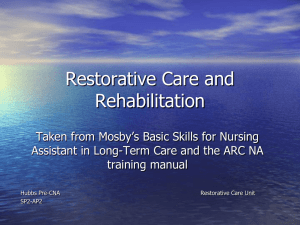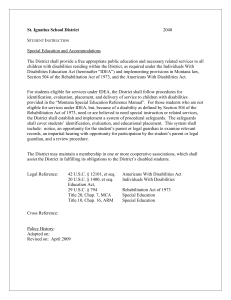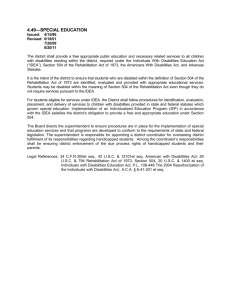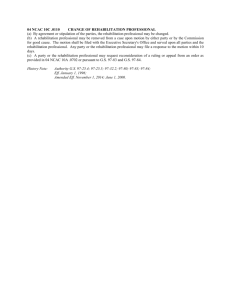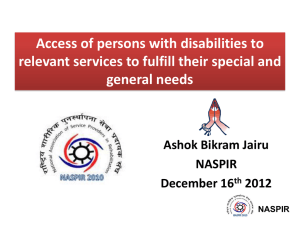I. Nature and Scope of Rehabilitation psychology
advertisement
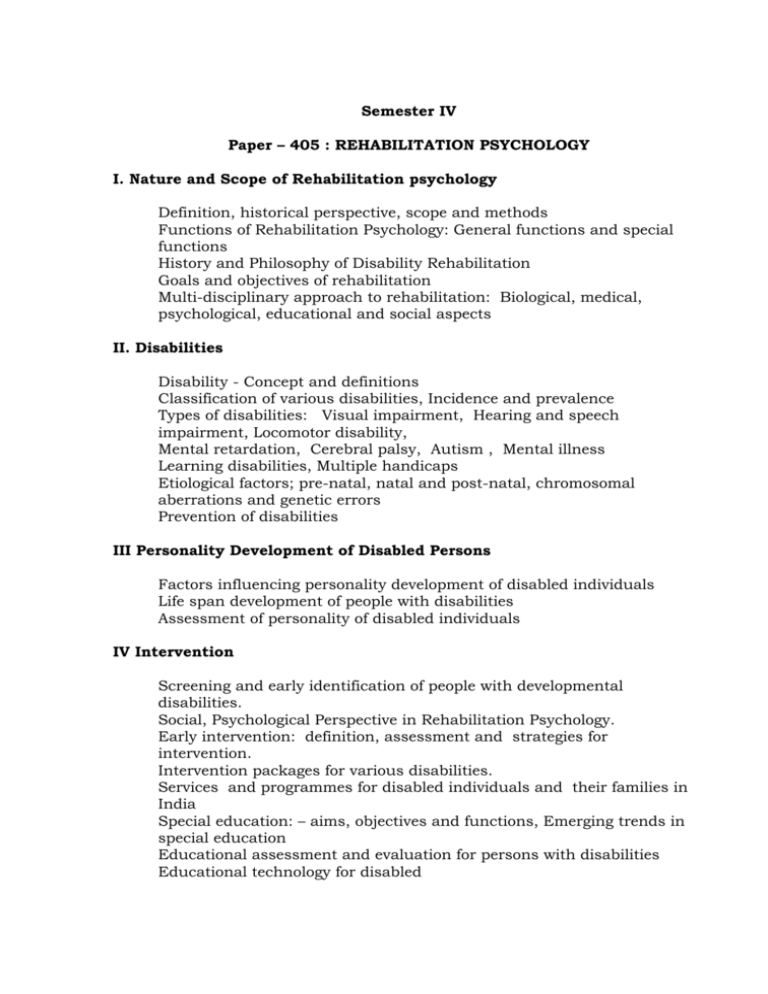
Semester IV Paper – 405 : REHABILITATION PSYCHOLOGY I. Nature and Scope of Rehabilitation psychology Definition, historical perspective, scope and methods Functions of Rehabilitation Psychology: General functions and special functions History and Philosophy of Disability Rehabilitation Goals and objectives of rehabilitation Multi-disciplinary approach to rehabilitation: Biological, medical, psychological, educational and social aspects II. Disabilities Disability - Concept and definitions Classification of various disabilities, Incidence and prevalence Types of disabilities: Visual impairment, Hearing and speech impairment, Locomotor disability, Mental retardation, Cerebral palsy, Autism , Mental illness Learning disabilities, Multiple handicaps Etiological factors; pre-natal, natal and post-natal, chromosomal aberrations and genetic errors Prevention of disabilities III Personality Development of Disabled Persons Factors influencing personality development of disabled individuals Life span development of people with disabilities Assessment of personality of disabled individuals IV Intervention Screening and early identification of people with developmental disabilities. Social, Psychological Perspective in Rehabilitation Psychology. Early intervention: definition, assessment and strategies for intervention. Intervention packages for various disabilities. Services and programmes for disabled individuals and their families in India Special education: – aims, objectives and functions, Emerging trends in special education Educational assessment and evaluation for persons with disabilities Educational technology for disabled V. Psychological Intervention Planning Intervention: Psychoanalytic Approach, Learning Theories and Strategies, Planning and Designing, Learning Situations, Counselling Strategies. Therapeutic services and Restorative techniques. Designing Training Programmes for Professionals: Training Need Analysis, Implementation of Training Programmes Monitory and Impact Studies. VI. Organization & Management Evolution of Non-Government Organizations Background Characteristics of Organization Capacity Building of Non-Government Organizations Recommended Readings: Bolton B., 1987. Handbook of Measurement and Evaluation in Rehabilitation, Second Edition. Paul H.Brookes, Baltimore, London. Brown Roy I., & E. Anne Hughson, 1987. Behavioural and Social Rehabilitation and Training. John Wiley & Sons Ltd. Chadha N.K. & Nath S., 1993. Issue and Trends in Rehabilitation Research. Friends Publication, Delhi. Gokhale S.D., 1987. Rehabilitation: Attitude and Reality. Rehabilitation Coordination India. Tata McGraw-Hill Publishing Company Limited, New Delhi. Golden C.J., 1984. Current Topics in Rehabilitation Psychology. Grune & Stratton, London. Nirbhay N.Singh, 1998. Comprehensive Clinical Psychology: Application in Diverse Populations, Volume 9. Elsevier Science, Pergamon. Alan Hilton & Ravic Ringlaben, 1998. Best and Promising Practices in Developmental Disabilities. Pro-Ed, Texas. Ali Baquer & Anjali Sharma, 1997. Disability: Challenges Vs Responses. Concerned Action Now, New Delhi. Gerald Hales, 1996. Beyond Disability: Towards an Enabling Society. SAGE Publications, New Delhi. John Swain, Vic Finkelstein, Sally French & Mike Oliver, 1994. Disabling Barriers – Enabling Environments. SAGE Publications, New Delhi. Jose Murickan & Georgekutty, 1995. Persons with Disabilities in Society. Kerala Federation of the Blind, Trivandrum. Kundu, C.L., 2000. Status of Disability in India – 2000. Rehabilitation Council of India, New Delhi. Mark L. Batshaw, M.D., 2000. Children with Disabilities, Fourth Edition. Paul H. Brookes Publishing Co. Michael Floyd, 1993. Information Technology Training for People with Disabilities, Disability and Rehabilitation Series 4. Jessica Kingsley Publishers, London. Pandey, R.S., & Advani, L., 1995. Perspectives in Disability and Rehabilitation. Vikas Publishing House, New Delhi. Rakesh Agarwal, Lal Advani & Rajinder Raina. Handbook on Disability Rehabilitation. Viba Press Pvt. Ltd., New Delhi. Evans, P. & Verma V. (Eds), 1990. Special Education: Past, Present and Future. The Falmer Press. Evans, R.C. & MC Laughlin P.J., 1993. Recent Advances in Special Education and Rehabilitation. Andover Medical Publishers, Boston. Robert A. Paton & James McCalman, 2000. Change Management: A Guide to Effective Implementation. Response Books, New Delhi. Edward Zigler & Dianne Bennett-Gates, 1999. Personality Development in Individuals with Mental Retardation. Cambridge University Press. Kundu C.L. 1994. Personality Development. -Indian Studies. Sterling Publication, Delhi. PAPER 405: REHABILITATION PSYCHOLOGY MODEL QUESTION PAPER Time : 3 hours Max. Marks:85 SECTION – A Answer any Three of the following: 3 x 20 = 60 1. Describe the functions of rehabilitation psychology. 2. Define the concept of disability. 3. Identify the major factors influencing the personality of disabled individuals. 4. What are the aims and objectives of special education. 5. What is meant by training need analysis? SECTION – B Answer any Five of the following: 5 x 5 = 25 1. Discuss the multidisciplinary approach to rehabilitation. 2. Prevention of disabilities is better than management of disabilities. Discuss. 3. Describe the life-span development of person with one type of disability. 4. Discuss social, Psychological perspectives of Rehabilitation Psychology. 5. Discuss the counselling strategies appropriate a rehabilitation of person with hearing and speech impairment. 6. Discuss the role of Psychologists in a non-government organization. 7. What is capacity building. 8. Discuss Training Need Analysis.


